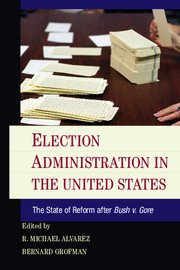Book contents
- Frontmatter
- Contents
- List of Contributors
- Foreword
- Acknowledgments
- Editors’ Introduction
- Part I Bush v. Gore in Perspective
- 1 Disputed Elections Post Bush v. Gore
- 2 The Cites that Counted
- 3 Bush v. Gore in the American Mind
- Part II What Has Changed since Bush v. Gore?
- Part III Remaining Challenges
- References
- Index
2 - The Cites that Counted
A Decade of Bush v. Gore Jurisprudence
Published online by Cambridge University Press: 05 October 2014
- Frontmatter
- Contents
- List of Contributors
- Foreword
- Acknowledgments
- Editors’ Introduction
- Part I Bush v. Gore in Perspective
- 1 Disputed Elections Post Bush v. Gore
- 2 The Cites that Counted
- 3 Bush v. Gore in the American Mind
- Part II What Has Changed since Bush v. Gore?
- Part III Remaining Challenges
- References
- Index
Summary
Introduction
When the U.S. Supreme Court issued the opinion that resolved the 2000 presidential election in George W. Bush’s favor, the five-justice coalition responsible for the decision went to great lengths to stress that the opinion should not be construed as an explication or expansion of any legal doctrine or concept. The per curiam opinion, presumably authored by Justice Kennedy and Justice O’Connor, specifically tried to narrow the applicability of the legal reasoning that resolved the equal protection claim by including the following passage:
The recount process, in its features here described, is inconsistent with the minimum procedures necessary to protect the fundamental right of each voter in the special instance of a statewide recount under the authority of a single state judicial officer. Our consideration is limited to the present circumstances, for the problem of equal protection in election processes generally presents many complexities.
(Bush v. Gore 531 U.S. 98, 109 (2000))In the immediate aftermath of the decision, the scholarly community primarily assessed either the nuanced legal arguments of the various dissenting and concurring opinions of Bush v. Gore or the impact the decision might have on the public regard for or institutional standing of the Court (Chemerinsky, 2001; Gibson, Caldeira, and Spence, 2003a; Gillman, 2001). Shortly after the initial round of scholarly analysis, the academy turned to questions about the more broad implications of the opinion for the doctrine of equal protection, public support of the Court, and the political preferences of the justices (Banks, Cohen, and Green, 2005; Clayton, 2002; Hasen, 2001, 2004; Levinson, 2002; Posner, 2001; Sunstein and Epstein, 2001). The Court and the opinion were criticized for a variety of defects and generally problematic legal reasoning (Dershowitz, 2003; Garrett, 2001; Gillman, 2001; Mebane, 2004). The concept of judicialization, the widely recognized phenomenon of expanded judicial activity into areas of politics and policy nominally and normally under the control of legislatures and executives, was the frame for consideration of the impact of the opinion on the other branches of government and the political process in general (Ferejohn, 2002; Hasen, 2005; Hirschl, 2002, 2004; Pildes, 2004; Shapiro and Stone Sweet, 2002; Smith and Shortell, 2007; Tate and Vallinder, 1995).
- Type
- Chapter
- Information
- Election Administration in the United StatesThe State of Reform after Bush v. Gore, pp. 32 - 47Publisher: Cambridge University PressPrint publication year: 2014



